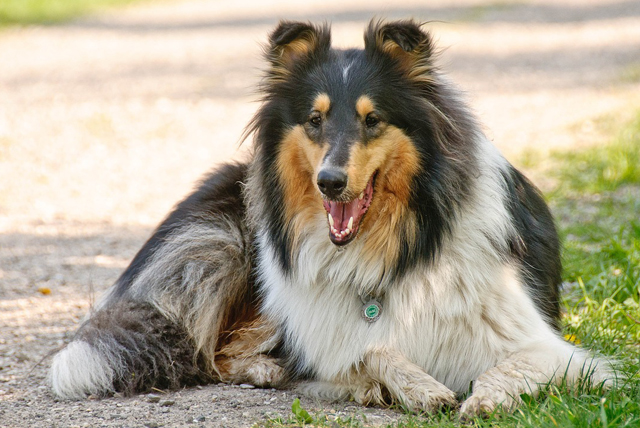iHeartDogs is reader-supported. When you buy via links on our site, we may earn an affiliate commission at no extra cost to you.

Bred to herd the wooly flocks of Scotland, Collies have plenty of experience rounding up wayward sheep. While your Collie might not be tending livestock, the whisper of their lineage makes them great at helping you corral the kids. And your long-haired lovely will enjoy every minute of that fun as these intelligent and gentle souls make excellent family dogs. Whether it’s playtime in the yard or cuddles on the couch, you’ll find your Collie right by your side.
Because the love and loyalty your Collie brings to the family means so much, you’ll do anything and everything for your dearest dog. And part of that ‘anything and everything’ is annual checkups with the vet to keep your pup fit and healthy. But no matter how diligent of a dog parent you are, illness and injury can still happen. Collies are prone to epilepsy, Lupus, Dermatomyositis, bloat, and Degenerative Myelopathy, and treating any of these conditions can get expensive. With pet insurance, though, you can be financially prepared to fend off whatever comes. To help you find peace of mind and the best pet insurance plan for your Collie, we’ve created a free and easy-to-use comparison tool to simplify the insurance quest.
Compare The Top 9 Pet Insurance Plans for Your Collie Using our Free No-Obligation Quote Tool below
The simplest way to compare pet insurance prices is to use our tool below. The comparison tool will show you quotes from the top 9 pet insurance carriers, including Trupanion, Pets Best, Lemonade, ManyPets, FIGO, HealthyPaws, Prudent Pet, Spot, and Embrace pet insurance.
How Much Does Pet Insurance for a Collie Cost?
Below are some sample pet insurance plans for a 1-year-old male Collie using the zip code 75001 (Texas) as an example.
- Pets Best – $43.87 per month
- Embrace – $34.50 per month
- Healthy Paws – $30.72 per month
- ManyPets – $40.11 per month
Ultimately, your plan’s premium will depend on several factors, including your dog’s age, size, and breed, as well as where you live. You also want to know what type of coverage your plan has and if it will help with Collie-specific health problems. Let’s get more into those medical conditions and how much you can expect to pay to treat them.
Common Health Problems Associated With Collies
Epilepsy
Collies are genetically predisposed to seizures, but the exact cause behind them is unknown. Seizure episodes that repeatedly happen without a primary cause are referred to as idiopathic epilepsy. Epileptic episodes happen suddenly, often without warning, and can last from a few seconds to minutes. There are different types of seizures, but symptoms can appear similar, with confusion, twitching, blinking, drooling, and behavior changes or bodywide stiffening that comes with rapid jerking movements.
Lupus
Lupus is an autoimmune condition in which a dog’s immune system attacks the body’s cells and tissues, leading to organ damage. Common symptoms include lethargy, fever, skin rashes, appetite loss, swollen lymph nodes, and arthritis. The cause behind Lupus is unknown, but genetics are suspected of playing a role. There are different types of Lupus, and while Collies are susceptible to all forms, the most commonly diagnosed type in the breed is Discoid lupus erythematosus. Also called “Collie Nose,” this form of Lupus affects the nose skin, causing lesions that peel, crack, and ulcerate.
Dermatomyositis (DMS)
Dermatomyositis is an autoimmune condition that involves the skin and muscles, causing skin lesions with crusting and hair loss. Diagnosed primarily in Shelties and Collies, the lesions appear where the muscle layer is thin between bone and skin. Common places are the face, ears, tail tips, legs, and feet. Symptoms can range from mild to painfully severe.
Bloat
While the Collie isn’t an extra-large dog breed, they have deep chests, making the breed more susceptible to Gastric dilatation-volvulus. Known more commonly as “bloat,” Gastric dilatation-volvulus happens when food, gas, and liquid painfully distend a dog’s belly and then twist the stomach. This twisting traps the stomach contents and compresses the abdomen’s blood vessels. Gastric dilatation-volvulus is a life-threatening situation for dogs and must be treated immediately.
Degenerative Myelopathy (DM)
Similar to Lou Gehrig’s Disease in humans, Degenerative Myelopathy is a neurological condition in which the white matter of the spinal cord degenerates, first causing weakness in the rear limbs. Over time, more symptoms, like tripping, stumbling, swaying while standing still, and even falling over, become evident. Affected Collies are typically older and progress to total paralysis in the back legs as this spinal cord disease worsens over time.
Typical Costs Of Treating Health Issues In Collies and How Pet Insurance Can Help
Taking your dog to the vet for annual visits is a bill you expect. But when the vet discovers a problem or emergency strikes, medical bills can stack up fast. With the right pet insurance plan for your Collie, you’ll be financially ready to deal with any bills, leaving you to concentrate on your best friend’s recovery.
Take a look at what it costs to treat the Collie health problems mentioned above:
- Epilepsy Costs: Because epilepsy isn’t a cut-and-dry condition to diagnose, your vet might perform a full batch of tests like bloodwork, a CT scan, or even an MRI, which can cost anywhere from $2,500 to $5,000 depending on where you live. Once a treatment plan has been established, prescription meds can cost $200 to $5,000 a year. And while your Collie adjusts to their meds, you may be required to do blood tests every month before moving to a twice-yearly process. Between diagnosis, treatment, and vet maintenance, epilepsy is pretty pricey to treat. Pet insurance can help maintain your finances by cutting test and prescription costs when dealing with this tricky but common health problem that troubles Collies.
- Lupus Costs: Diagnosing Lupus can be tricky and involves a lot of diagnostics, with tests consisting of X-rays, ultrasounds, bloodwork, and biopsies. The vet may also collect fluid from inflamed joints to help make a final diagnosis. Costs could run $250 – $1,000. Once diagnosed with Lupus, dogs will most likely need a cocktail of medicines, including steroids and immunosuppressant drugs, which could create drug bills of $250-$1,000. And some of these meds require monitoring via bloodwork which could create another set of bills that can range from just a hundred bucks a year to about a thousand. Between the initial costs of diagnosis and years of medication, you’re looking at the potential for an expensive disease. But if you have a pet insurance plan for your Collie before Lupus attacks, your costs for expensive tests and prescriptions could see significant reductions.
- Dermatomyositis Costs: If your vet suspects Dermatomyositis in your Collie, biopsies can confirm the diagnosis, with the final price of the collection procedure varying from $500 to $1,000. Managing DMS involves drugs that quiet pain and inflammation and others that modify the immune system and boost circulation. These medications are expensive at a minimum of $100 to $200 every month. Getting a pet insurance plan for your Collie before a problem like Dermatomyositis occurs will bring savings on bills for tests, vet visits, and medications.
- Bloat Costs: The only way to correct GDV is an emergency surgery in which the stomach is corrected and tacked to the abdominal wall. The estimated surgery costs to repair GDV average between $2,000 and $5,000, but complications could inflate bills further. And dogs who experience bloat once run a higher risk of having it happen again. With the right pet insurance plan for your Collie, you’ll be saved from the sudden and staggering bills bloat can create and never be forced to make heartbreaking choices because you can’t afford care.
- Degenerative Myelopathy Costs: While DM typically isn’t a painful disease, it is one that needs monitoring. To diagnose and keep tabs on the degeneration, your Collie might need expensive scans, which can cost as little as $150 per X-ray, or if an MRI is required, you could be looking at a bill of $5,000 depending on where you live. And with no definitive treatment for DM, vets often prescribe physical therapy and hydrotherapy to keep Collies feeling their strongest. Costs for these therapies average $50 per session. Keeping track of a degenerative condition can become expensive over time, but health insurance for your dog will knock costs down, meaning you’ll have more cash to spend on tasty treats and toys for your best friend!
What Is Pet Health Insurance And Why Do I Need It For My Collie?
Pet health insurance works very similarly to human health insurance. Your policy quote will range in monthly price, depending on your dog’s breed, age, and where you live. Typically, you’ll spend around $15-$72 per month as a pet parent.
Pet insurance is mainly about peace of mind, knowing you won’t be totally overwhelmed in case of an emergency. Enrolling even when your dog is young and healthy will ensure you have plenty of coverage when they need expensive medical care later. If you choose a plan more suited to your dog’s particular breed, you’ll be more prepared when something happens later on in their life.

Some plans cover accidents and illnesses, while others only cover accidents. Certain plans do cover breed-specific illnesses, and others do not. It all depends on what type of coverage you choose. With our free pet insurance comparison tool, you can get quotes from multiple insurance companies with no obligation to commit.
Whatever plan you choose, you’ll feel better knowing you can take care of your dog when they need you most. Plus, you won’t have to suddenly shell out thousands of dollars. Learn more about how pet insurance works here.
Pet Insurance Carrier Comparisons
- 9 Best Pet Insurance Plans for Dogs
- Best Cheap Pet Insurance
- Trupanion Vs. Pets Best Pet Insurance
- Trupanion Vs. Lemonade Pet Insurance
- HealthyPaws Vs. Embrace Pet Insurance
- HealthyPaws Vs. Trupanion Pet Insurance
- Embrace Vs. Trupanion Pet Insurance
- Embrace Vs. Lemonade Pet Insurance
- Trupanion Vs. FIGO Pet Insurance
- Prudent Pet Vs. Trupanion Pet Insurance
- Embrace Vs. ManyPets Pet Insurance
- Embrace Vs. FIGO Pet Insurance
- Prudent Pet Vs. Embrace Pet Insurance
- HealthyPaws Vs. ManyPets Pet Insurance
- HealthyPaws Vs. FIGO Pet Insurance
- Prudent Pet Vs. HealthyPaws Pet Insurance
- HealthyPaws Vs. Lemonade Pet Insurance
- Pets Best Vs. ManyPets Pet Insurance
- Pets Best Vs. FIGO Pet Insurance
- Prudent Pet Vs. ManyPets Pet Insurance
- Prudent Pet Vs. Pets Best Pet Insurance
- Embrace Vs. Pets Best Insurance
- HealthyPaws Vs. Pets Best Pet Insurance
- ManyPets Vs. Lemonade Pet Insurance
- Lemonade Vs. FIGO Pet Insurance
- Trupanion Vs. ManyPets Pet Insurance
- ManyPets Vs. FIGO Pet Insurance
- Lemonade Vs. Pets Best Pet Insurance
- Prudent Pet Vs. Lemonade Pet Insurance
- Prudent Pet Vs. FIGO Pet Insurance
Breed Pet Insurance
- Pet insurance for Akitas
- Pet insurance for Alaskan Malamutes
- Pet insurance for American English Coonhounds
- Pet insurance for American Staffordshire Terriers
- Pet insurance for Australian Cattle Dogs
- Pet insurance for Australian Shepherds
- Pet insurance for Basset Hounds
- Pet insurance for Beagles
- Pet insurance for Bernese Mountain Dog
- Pet insurance for Bichon Frises
- Pet insurance for Bloodhounds
- Pet insurance for Border Collies
- Pet insurance for Boston Terriers
- Pet insurance for Boxers
- Pet insurance for Bulldogs
- Pet insurance for Bullmastiffs
- Pet insurance for Bull Terriers
- Pet insurance for Cane Corsos
- Pet insurance for Cavaliers
- Pet insurance for Chesapeake Bay Retrievers
- Pet insurance for Chihuahuas
- Pet insurance for Chinese Crested Dogs
- Pet insurance for Chow Chows
- Pet insurance for Cocker Spaniels
- Pet insurance for Collies
- Pet insurance for Corgis
- Pet insurance for Dachshunds
- Pet insurance for Dobermans
- Pet insurance for Dogue De Bordeaux
- Pet insurance for English Springer Spaniels
- Pet insurance for French Bulldogs
- Pet insurance for German Shepherds
- Pet insurance for German Shorthaired Pointers
- Pet insurance for Goldendoodles
- Pet insurance for Golden Retrievers
- Pet insurance for Greyhounds
- Pet insurance for Great Danes
- Pet insurance for Great Pyrenees
- Pet insurance for Havanese
- Pet insurance for Huskies
- Pet insurance for Jack Russells
- Pet insurance for Labrador Retrievers
- Pet insurance for Labradoodles
- Pet insurance for Lhasa Apsos
- Pet insurance for Maltese
- Pet insurance for Mastiffs
- Pet insurance for Miniature Pinschers
- Pet insurance for Mixed Breeds (small)
- Pet insurance for Mixed Breeds (medium)
- Pet insurance for Mutts
- Pet insurance for Newfoundlands
- Pet insurance for Old English Sheepdogs
- Pet insurance for Papillons
- Pet insurance for Pekingese
- Pet insurance for Pit Bulls
- Pet insurance for Pomeranians
- Pet insurance for Poodles
- Pet insurance for Pugs
- Pet insurance for Rhodesian Ridgebacks
- Pet insurance for Rottweilers
- Pet insurance for Saint Bernards
- Pet insurance for Samoyeds
- Pet insurance for Schnauzers
- Pet insurance for Shar-Peis
- Pet insurance for Shelties
- Pet insurance for Shiba Inus
- Pet insurance for Shih Tzu
- Pet insurance for Staffordshire Bull Terrier
- Pet insurance for Vizslas
- Pet insurance for Weimaraners
- Pet insurance for Westies
- Pet insurance for Whippets
- Pet insurance for Yorkies
Pet Insurance by City
- Pet Insurance in San Diego
- Chicago Pet Insurance
- New York City Pet Insurance
- Pet Insurance in Seattle
- Pet Insurance in Los Angeles
- Pet Insurance in Austin
- Pet Insurance in San Antonio
- Pet Insurance in Miami
- Pet Insurance in Philadelphia
- Pet Insurance in Sacramento
- Pet Insurance in Orlando
- Pet Insurance in San Francisco
- Pet Insurance in Houston
- Pet Insurance in Dallas
- Pet Insurance in Tampa
- Pet Insurance in Pittsburgh
Pet Insurance by State
- Pet Insurance in California
- Pet Insurance in Texas
- Pet Insurance in Florida
- Pet Insurance in Pennsylvania
- Pet Insurance in Washington State
- Best Pet Insurance in Michigan
- State of Delaware Pet Insurance
- Pet Insurance in NC
- Pet Insurance in NJ
- Pet Insurance in Colorado
- Pet Insurance in Ohio
- Pet Insurance in Oregon
- Pet Insurance in Indiana
- Pet Insurance in Oklahoma
- Pet Insurance in Utah
- Pet Insurance in New York
- Pet Insurance in Massachusetts
- Pet Insurance in Arizona
- Pet Insurance in Minnesota
- Pet Insurance in Connecticut
- Pet Insurance in Wisconsin
- Pet Insurance in Hawaii
- Pet Insurance in Iowa
- Pet Insurance in New Hampshire
- Pet Insurance in Alabama
- Pet Insurance in Maine
- Pet Insurance in Maryland
- Pet Insurance in Rhode Island
- Pet Insurance in Arkansas
- Pet Insurance in Illinois
- Pet Insurance in Nebraska
- Pet Insurance in Alaska
- Pet Insurance in Louisiana
- Pet Insurance in South Carolina
- Pet Insurance in Vermont
- Pet Insurance in Georgia


 Toledo, United States.
Toledo, United States.